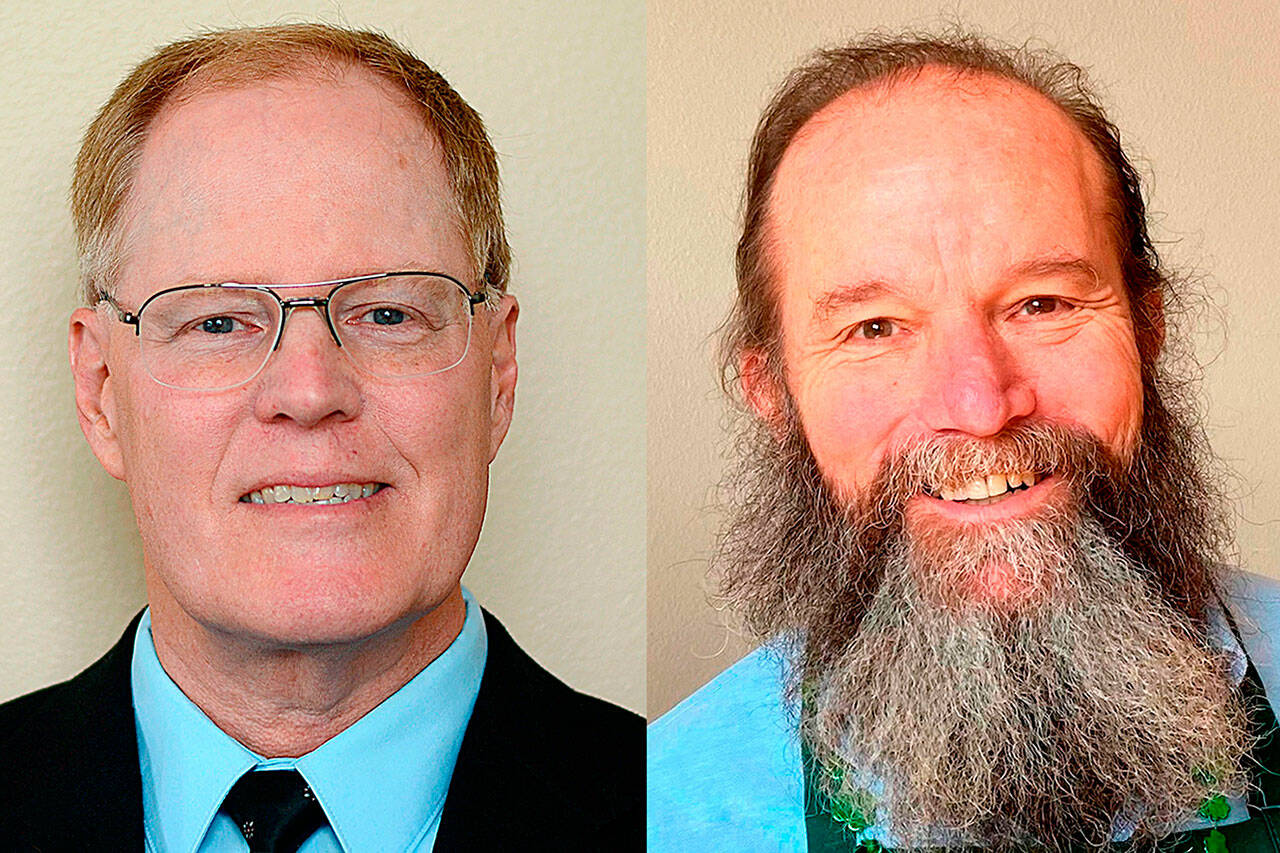Editor’s note: This story continues coverage of the League of Women Voters of Clallam County’s Oct. 3 online forum. View it at youtube.com/@leagueofwomenvotersclallam279.
Included in this story are Sequim city council candidates Jim Black and Dan Butler running for position 2. Patrick Day and Harmony Rutter running for position 6 will appear in a future edition and online. Ballots were mailed out last week, and Election Day is set for Tuesday Nov. 7.
Black/Butler
Black, a retired software engineer, said he’s concerned most about public safety, affordable workforce housing, and job growth.
As Sequim grows, Black said it’s showing “concerning signs of change for the worse, including tent encampments, stores locking up merchandise, and people living on the streets.”
“We have to do better than Seattle, Portland and San Francisco,” he said.
Some of his preferred solutions include offering “full pathways to recovery,” and work training.
Butler, a part-time church administrator and a language researcher, said while serving on the city’s Planning Commission, he’s become familiar with Sequim’s challenges.
“I’m wired to look for ways to be of service,” he said.
“Sequim’s people depend on council members who are committed to ethical conduct, integrity and transparency.
“We need council members who value diverse perspectives, consider them and seek consensus. We want to thrive and be responsible and consider those among us who have less.”
Asked about addressing the affordable/workforce housing crisis, Butler supports ongoing city initiatives and speaking to developers about how to incentivize developing workforce housing and expand land trust initiatives similar to Habitat for Humanity’s proposed city project.
Black also said he supports Habitat’s project, and that the city needs to look at zoning and permitting, and work with Clallam County officials on building housing outside of city limits.
“This is a small area on the peninsula,” he said. “People don’t necessarily have to live in Sequim. They can commute to work. We can try to work out options there.”
Jobs
Both men supported the city council’s decision to pledge $250,000 to a Career and Technical Education (CTE) building at Sequim High School, despite the project being put on hold.
Black said he grew up in Milwaukee, Wis. so there were a lot of of options to pursue going into a trade, and his two sons learned computer networking in high school.
Butler said providing technical training is essential as Sequim has moved away from an emphasis on agriculture to a service-based and seasonal tourist-based economy.
He wants the city to look more into high speed internet, more bike and pedestrian friendly streets and sidewalks, and more collaboration with sister cities.
Climate
Posed with a question about climate risks on the Olympic Peninsula, Black said he feels the area is ahead of the game with receiving most of its electricity from hydroelectric power, and Clallam PUD has said it’s on its way to achieving conservation and alternative energy goals.
He said the city does recycling, and solid waste management well, and public transportation is “right on track.”
Butler said as we learn more about climate, he’s interested in policy discussions on what the community can do today for the future.
He added that the city must continue its work in the “Sustainable Sequim” document and continue to refresh it as new technologies emerge, and continuously refer to in policy discussions.
Health and human services
When asked about the city’s health and human service funding level, Butler feels it should be more.
“The current crisis we have with human services is systemic to our our national policy and Sequim is not the source of the problem and the solution won’t be won’t be solved in Sequim,” he said.
Butler said he’s learning to be more mindful of less privileged people and learn their stories.
While working at St Luke’s Episcopal Church, Butler said he engages many people sleeping by their building and he hasn’t “met someone who has been making a deliberate choice to live without shelter.”
“Each one has a story,” he said.
Black said what the city spends is appropriate to what’s effective.
His concern, he said, is for people addicted drugs and/or have mental illness and getting them help, trained and back to work if possible. He said connecting them with nonprofits like Oxford House would be effective along with training more young people in trades.
Comprehensive Plan
As for priorities in relation to an upcoming update of the city’s 10-year Comprehensive Plan, Black said his emphasis would be on addressing drug addiction and mental health issues.
“A small city like Sequim doesn’t have the kind of money to deal with that if we if that gets out of hand,” he said.
Additionally, Black said they need to make schools attractive to people who want to move here.
On the city’s Planning Commission, Butler said he’s become familiar with the city’s Comprehensive Plan and how it drives investment priorities for infrastructure and what roads, sewer and water projects are prioritized. He said the most important part initially of the 2025-2035 plan will be community stakeholder meetings.
He closed by saying he looks forward to a “chance to listen to increase my understanding to seek consensus and contribute to excellence in the governance of Sequim.”
Black closed by saying that he heard a lot of opportunity for people to meet in the middle on issues and move forward.
“I think there’s so many ideas coming from the city council we can work together and come up with good things for Sequim,” he said.



